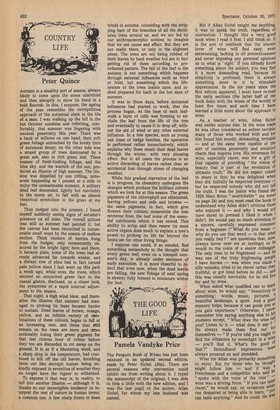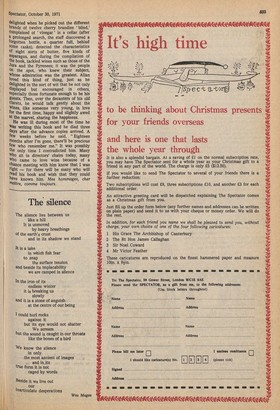Pamela Vandyke Price
The Penguin Book of Wines has just been reissued in an updated second edition, made by Peter Sichel (40p). There are several reasons why convention could inhibit me from writing about it. I typed the manuscript of the original, I was able to help a little with the new edition, and I was the last pupil of the author, Allan Sichel, for whom my late husband was named. But if Allan Sichel taught me anything, it was to speak the truth, regardless of convention. I thought this a very good book when I read it first. I still think so. It is the sort of textbook that the sincere lover of wine will find easy, even entertaining, lacking in all pretentiousness and never imposing any personal opinions as to what is 'right.' If you already know something about the subject, you may find it a more demanding read, because its simplicity is profound; there is always something more in it to stimulate appreciation. In the six years since the first edition appeared, I must have re-read the early sections (the latter half of the book deals with the wines of the world) at least five times and each time I have learned a little more about the approach to wine.
As a teacher of wine, Allan Sichel was unlike anyone else. In the wine trade he was often considered an enfant terrible; many of those who worked with and for him found him moody, demanding, irritable and at the same time capable of the sort of careless generosity and sensitive charm that inspires love, His reverence for wine, especially claret, was for a gift of God capable of providing "the vision of beauty that is part of the revelation of ultimate truth." He did not expect others to share in this; he was delighted when they did. Initially he respected everyone but he respected nobody who did not tell the truth. I was the junior who found the 1929 Haut Brion " undrinkable " (as noted on page 24) and you must read the book to understand why Allan didn't criticise those who enjoyed it — and why I would not have dared to pretend I liked it when I didn't. He would pay as much attention to a sincere, carefully expressed comment from a beginner (" What do you mean why do you use that word — is that what you really feel ? " are questions that, noW, always hover over me at tastings) as he would to the voice of a senior colleague. The only time to be frightened — and he was one of the truly frightening people I have known — was when you made a silly mistake, tried to be clever rather than truthful, or got tired before he did — and this was usually inevitable, for he did live for and by wine. When asked what qualified one to learn about wine, he would say, "Sensitivity ta something : words, music, pictures, a beautiful landscape, a sport. And a goOd memory helps, because it can guide you as you gain experience." Otherwise, I never remember him saying anything else to hi!, students except, "What does the wine te!! you? Listen to it — what does it say ? He always made them find out Or themselves — "If you're told you ought.t° find the Alhambra by moonlight in a Wole, — you'll find it. What's the good a' that ?" Secondhand impressions Were always pounced on and shredded. Wine for Allan was primarily something to enjoy. But for those who he thought might follow him — and it was Frenchman and a competitor who said he "spoke with the voice of the vine' wine was a driving force. "If you can taste claret," he would say, on occasions Wher/„ one despaired of being able to learn, " can taste anything." And he could. He vva' delighted when he picked out the different brands of twelve cherry brandies ' blind,' Complained of 'vinegar ' in a cellar (after a prolonged search, the staff discovered a forgotten bottle, a quarter full, behind some casks), detected the characteristics Of eight sorts of butter, five kinds of asparagus, and during the compilation of the book, tackled wines such as those of the Jura and the Pyrenees; it was the people O n the spot, who knew their subject, Whose admiration was the greatest. Allan loved this kind of thing, just as he delighted in the sort of wit that he not only displayed but encouraged in others, especially those fortunate enough to be his guests. Then, over the decanters of his old clarets, he would talk gently about the Wines, like someone very young, in love for the first time, happy and slightly awed at the marvel, sharing the happiness.
He was ill during most of the time he Was writing this book and he died three days after the advance copies arrived. A few weeks before he said, "Eighteen months after I'm gone, there'll be precious few who remember me." It was possibly the only time I contradicted him. Many Who sit in directors' chairs today, many Who came to love wine because of a Chance meeting with him know that I was right — for there will be many who will read his book and wish that they could have known him. Mes hommages, cher nraltre, comme toujours.



































 Previous page
Previous page